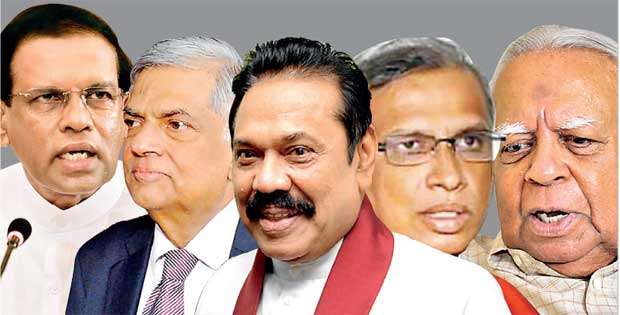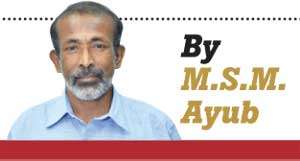Reply To:
Name - Reply Comment

The debate between the Maithri-Mahinda group and the United National Front over the Opposition Leader post is a best case in point with regard to the ridiculous level the Sri Lankan politics has stooped to. This has introduced a new but totally unnecessary Constitutional conundrum into the Sri Lankan politics.
The Constitutional impasse that was brought in by the decision by President Maithripala Sirisena to sack Ranil Wickremesinghe from the post of Prime Minister and replace him with former President Mahinda Rajapaksa on October 26 was resolved by the Supreme Court on December 13 by its ruling against the dissolution of the Parliament. However, the political crisis that was created by the October 26 regime change is continuing and the row over the Opposition Leader post is an extension of it.
President Maithripala Sirisena’s decision to change the regime or the October 26 Constitutional coup, as many people call it had paved the way for seven legal actions  by various people. They were the case against the dissolution of Parliament, the case seeking a Writ of Quo Warranto against Mahinda Rajapaksa’s Premiership and his Cabinet, Sarath Weerasekara’s case against convening of the Parliament, the case seeking a Writ of Quo Warranto against the Parliament membership of Ranil Wickremesinghe, the contempt of court case against Speaker Karu Jayasuriya over convening of Parliament the contempt of court case against former Chief Justice Sarath N. Silva and the writ petition seeking an inquiry into the state of mind of the President.
by various people. They were the case against the dissolution of Parliament, the case seeking a Writ of Quo Warranto against Mahinda Rajapaksa’s Premiership and his Cabinet, Sarath Weerasekara’s case against convening of the Parliament, the case seeking a Writ of Quo Warranto against the Parliament membership of Ranil Wickremesinghe, the contempt of court case against Speaker Karu Jayasuriya over convening of Parliament the contempt of court case against former Chief Justice Sarath N. Silva and the writ petition seeking an inquiry into the state of mind of the President.
Of them, only one case, the case against dissolution of Parliament has been concluded, having a huge bearing on other cases as well and ending for some extent the 51 day political impasse. Yet, there are still possibilities of new political crises cropping up with the rulings on the other pending cases. It is against this backdrop that a new row over the Opposition Leader post has been brought to the fore.
"The Constitutional impasse that was brought in by the President to sack RW from the post of PM and replace him with MR was resolved by the SC against the dissolution of Parliament. However, the political cisis is continuing"
Mahinda Rajapaksa was recognised as the Opposition Leader on December 18 by the Speaker following his resignation as the Prime Minister three days before, in the face of his inability to muster the majority support in Parliament. Then Tamil National Alliance (TNA) leader Rajavarothiam Sampanthan stated that he who had been holding the Opposition Leader post for three years had not been removed from the post by anybody and therefore he was still the Opposition Leader. He also said that in the light of the recognition of Mahinda Rajapaksa as the Opposition Leader, there were two Opposition Leaders in Parliament.
Along with this law point by his leader, TNA Spokesman M.A. Sumanthiran also dropped a bombshell by arguing that Mahinda Rajapaksa and some of his loyalists have lost their Parliament membership as they have obtained the membership of the Sri Lanka Podujana Peramuna (SLPP) a month ago. He quoted the Constitution as saying “Where a member of Parliament ceases by resignation, expulsion or otherwise, to be a member of a recognised political party or an independent group on whose nomination paper his name appeared at the time of his becoming of such member of Parliament, his seat shall become vacant upon the expiration of a period of one month from the date of his ceasing to be such member.”
"In the light of the recognition of MR as the Opposition Leader, there were two Opposition Leaders in Parliament"
"TNA Spokesman Sumanthiran by argued that MR and some of his loyalists have lost their Parliament membership as they have obtained the membership of SLPP a month ago"
This prompted a frightened Rajapaksa and his group in the House to unashamedly deny that they obtained the membership of the SLPP. Their audacity to tell the people such a diabolical lie despite the whole country having watched them in TV getting the membership of the SLPP was amazing. SLPP National Organiser and Rajapaksa’s brother Basil Rajapaksa said that though members of the SLFP including his brother applied for the membership of his party, they had not been given it yet.
It was on November 11, amidst the post dissolution constitutional gridlock that Rajapaksa obtained the membership of the SLPP from its Chairman Professor G.L.Peiris and his loyalists in turn got it from him.
When the UPFA members in Parliament said that they, including Rajapaksa were still the members of the SLFP and the UPFA, Sumanthiran dropped another bombshell questioning as to how the members of the party headed by the President who is also the head of the Cabinet can be the members of the Opposition. In spite of Pivithuru Hela Urumaya leader Udaya Gammanpila having answered this question citing precedents in history, the Mahinda loyalists seemed to be perplexed by Sumanthiran’s question.
"MR’s and his group’s denial that they obtained the membership of the SLPP was amazing"
"The power struggle manifested through the 51 day Constitutional and political impasse had brought the State machinery to a standstill position"
Yet, Sumanthiran seems to be wrong in his both arguments. The Constitution says one would lose his Parliament membership only if he lost the membership of the party through which he was elected or appointed to the Parliament. It does not say that he is no longer an MP if he obtained the membership of another party. Therefore, one can be an MP so long as he is a member of his original party, despite him becoming member of any number of other parties.
Fortunately for Rajapaksa and his loyalists, they had not been removed from the membership of the UPFA, the party through which they were elected and appointed to the Parliament, for obtaining the membership of the SLPP. UPFA General Secretary, Minister Mahinda Amaraweera, after this issue cropped up had informed the Speaker that Rajapaksa and his loyalists were still the members of his party. Therefore, Rajapaksa, the Kurunegala District MP and his group seem to be out of danger.
Even if they lose the membership of the Parliament, another set of UPFA members would replace them, maintaining the status of the UPFA as the main Opposition party. They would then again be able to lay claim to the Opposition Leader post.
And, as Gammanpila cited from history, despite the President Constitutionally being the head of the Cabinet, his party had been in the Opposition and one of the members of his party had been the Opposition Leader for four times in history. It was Gamini Dissanayake who held the Opposition Leader post during President D.B. Wijethunga’s tenure, after the General Election in 1994. President Chandrika Kumaratunga appointed her party stalwart Ratnasiri Wikramanayake as the Opposition Leader in 2001 and in 2015, when Maithripala Sirisena won the Presidential Election, Nimal Siripala de Silva was appointed Opposition Leader.
In spite of there being a moral issue in the President being the head of the Cabinet while his party is in the Opposition, it has been history, apart from the Constitution having sanctioned it.
"The Constitution says one would lose his P’ment membership only if he lost the membership of the party through which he was elected or appointed to P’ment. It does not say that he is no longer an MP if he obtained the membership of another party"
A party cannot be the ruling party just because its leader is the President of the country, as it would lead to situations where the party with the majority power might become the Opposition.
Sampanthan may not be removed yet from the post of Opposition Leader. But he is well aware that he does not command the confidence of the Opposition, after October 26. The TNA opposed Mahinda Rajapaksa’s recent appointment to the post of Prime Minister on the ground that he did not command the confidence of the Parliament.
Then, how can it be appropriate for Sampanthan to lay claim to the Opposition Leader post when he does not command the confidence of the Opposition?
The power struggle manifested through the 51 day Constitutional and political impasse had brought the State machinery to a standstill position. Prolonging the power struggle through more Constitutional issues would not in any way be in the interest of the people.